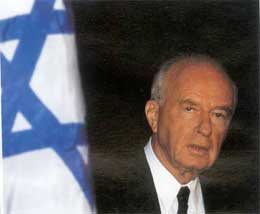 |
|
THE
LEGACY OF YITZHAK RABIN - Seven
years after the assassinations of
Lincoln, Kennedy, and Martin Luther
King, the people of the United States
were still struggling to heal their
wounds and find their way through
times of war and upheaval. Whether
it was the toil of Reconstruction,
the division over Vietnam, or the
sacrifices of the Civil Rights movement,
each of these great leaders was
a guiding light snuffed out far
too early in their lives –
and as a result, the people they
led were forced to weather the coming
storms alone. In November 2002,
seven years after the assassination
of Yitzhak Rabin, Israelis and Palestinians
had been embroiled for more than
a year in the torturous cycle of
violence that continues to this
day. The peace for which Rabin had
given so much seemed like a distant
dream.
 In
Israel today, Rabin’s name
is rarely mentioned. For a growing
number of Israelis who have lost
loved ones in the militarization
of the Palestinian intifadeh uprising,
the mentality has shifted from a
willingness for compromise to feeling
under siege. Yasser Arafat and his
PLO have been marginalized, isolated,
and accused by Ariel Sharon’s
government of supporting the Islamist
extremist groups whose bombings
have stigmatized many Israelis to
the possibility of peace and reconciliation.
Sadly, the hope and unity so beautifully
expressed on the night of Rabin’s
death are now only a fading memory.
As expressed by Nancy O’Malley,
a distinguished teacher of the humanities
at Boston Latin School, “Unfortunately
our memories are short, and we forget
that only a little while ago Rabin
held out the very real prospect
of peace, but ever since Sharon
instigated the intifadeh by visiting
the Temple Mount, there’s
been so much violence and bloodshed,
oppression and reaction to oppression,
that it wiped out the memory of
what Rabin had done.”
In
Israel today, Rabin’s name
is rarely mentioned. For a growing
number of Israelis who have lost
loved ones in the militarization
of the Palestinian intifadeh uprising,
the mentality has shifted from a
willingness for compromise to feeling
under siege. Yasser Arafat and his
PLO have been marginalized, isolated,
and accused by Ariel Sharon’s
government of supporting the Islamist
extremist groups whose bombings
have stigmatized many Israelis to
the possibility of peace and reconciliation.
Sadly, the hope and unity so beautifully
expressed on the night of Rabin’s
death are now only a fading memory.
As expressed by Nancy O’Malley,
a distinguished teacher of the humanities
at Boston Latin School, “Unfortunately
our memories are short, and we forget
that only a little while ago Rabin
held out the very real prospect
of peace, but ever since Sharon
instigated the intifadeh by visiting
the Temple Mount, there’s
been so much violence and bloodshed,
oppression and reaction to oppression,
that it wiped out the memory of
what Rabin had done.”
 Even
in the darkest times, however, there
is still hope to be gleaned from
the example set by Yitzhak Rabin.
With just a few handshakes over
the span of a few years, the courageous
leadership of one man was able to
produce exponentially greater waves
of change. The respect Rabin earned
over several decades of dealing
with Arab countries, the historic
peace treaty with Jordan, the limitless
promise in those few months of excitement
– all of it was a stunning
demonstration showing that a lone
leader could single-handedly bring
together two seemingly irreconcilable
sides. Sharon’s visit to the
Temple Mount, proved that a single
leader could shatter it just as
easily.
Even
in the darkest times, however, there
is still hope to be gleaned from
the example set by Yitzhak Rabin.
With just a few handshakes over
the span of a few years, the courageous
leadership of one man was able to
produce exponentially greater waves
of change. The respect Rabin earned
over several decades of dealing
with Arab countries, the historic
peace treaty with Jordan, the limitless
promise in those few months of excitement
– all of it was a stunning
demonstration showing that a lone
leader could single-handedly bring
together two seemingly irreconcilable
sides. Sharon’s visit to the
Temple Mount, proved that a single
leader could shatter it just as
easily.
 So
what, then, is Rabin’s legacy?
Most centrally, it is the idea he
planted in the minds of both Israelis
and Palestinians that compassion
and the will to forgive were all
they needed to form a bridge across
decades of hatred and distrust.
It was the essential faith and belief
in the ability of humanity to make
common cause in the knowledge that
mutual hatred would breed only mutual
suffering. Rabin’s actions
were the profound validation of
the tenet that it took just one
voice to stem the tide of suffering
by two proud and ancient peoples.
The success of his peace outreaches
to Arab countries proved it was
possible; the heartbreaking conflict
in Israel today proves it is needed
now.
So
what, then, is Rabin’s legacy?
Most centrally, it is the idea he
planted in the minds of both Israelis
and Palestinians that compassion
and the will to forgive were all
they needed to form a bridge across
decades of hatred and distrust.
It was the essential faith and belief
in the ability of humanity to make
common cause in the knowledge that
mutual hatred would breed only mutual
suffering. Rabin’s actions
were the profound validation of
the tenet that it took just one
voice to stem the tide of suffering
by two proud and ancient peoples.
The success of his peace outreaches
to Arab countries proved it was
possible; the heartbreaking conflict
in Israel today proves it is needed
now.
<beginning>